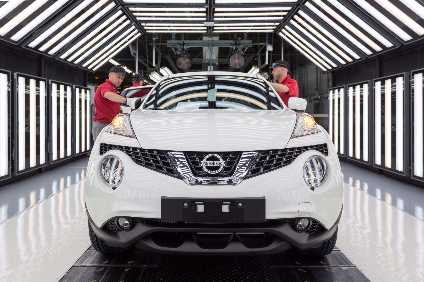
UK car production rose to a 17-year high in 2016, according to the latest figures published by the Society of Motor Manufacturers and Traders (SMMT).
Some 1,722,698 vehicles rolled off production lines last year from some 15 manufacturers, an 8.5% increase on total production in 2015 – and the highest output since 1999.

Discover B2B Marketing That Performs
Combine business intelligence and editorial excellence to reach engaged professionals across 36 leading media platforms.
The SMMT said that exports are at record levels as a result of investments made over recent years in new models and production facilities. The SMMT was at pains to point out that the growth of production last year was not a ‘post-Brexit bounce’. The trade association pointed out that ten new car models began production in the UK last year, nine of them from premium brands which has helped make the UK the second biggest producer of premium cars after Germany and the third biggest car producer in Europe.
However, total committed investment announcements in the automotive sector in 2016 were approximately GBP1.66bn across a number of companies – down from GBP2.5bn in 2015.
Production growth was predominantly driven by overseas demand, with global appetite for British-built cars rising by 10.3% to an all-time high of 1,354,216 – a second consecutive annual record. Around eight out of every 10 cars manufactured in the UK is now exported, bound for one of 160 markets worldwide.
It was continuing economic recovery across Europe that accounted for the bulk of export growth. Exports to the rest of the EU grew 7.5% to 758,680 and accounted for more than half of all UK car exports. Furthermore, SMMT said that Europe supplies the majority of components within UK-built vehicles, underlining the critical importance of tariff and barrier-free trade to future UK automotive production.
Growth was strong across a number of markets, notably the US – the UK’s biggest export destination after the EU – where demand rose by almost half (47.2%) meaning it now accounts for around 14.5% of all UK car exports. Notable uplifts were also seen in Turkey, Japan and Canada whilst China, third on the list of export markets, grew by a more modest 3.1% with 88,610 vehicles exported last year.
Domestic demand for UK built cars also grew last year, up 2.4% in the year, and the UK remains the second largest car market in Europe, again after Germany. One in seven new cars registered by UK buyers is now made in Britain, up from one in eight three years ago.
Mike Hawes, SMMT Chief Executive, said: “The tremendous growth in UK production is testament to the global competitiveness of the UK automotive sector. High class engineering, advanced technology and a workforce committed to quality have helped turn around the industry, making the UK among the most productive places in Europe to make cars.
“Significant investment in new plants and products over the past few years has driven this growth, not a post-Brexit bounce. We want trade deals but they must be the right deals, not rushed deals. Failure to do so could damage UK automotive manufacturing beyond repair.”
However, Hawes expressed concern over the outlook for UK car manufacturing and uncertainties to UK-Europe trading arrangements presented by Brexit. At a media presentation in London, he noted that the UK auto industry has said that it wants the UK to remain a member of the EU’s single market but that does not look possible, politically, and that a free trade agreement with the EU now looks more likely. “Brexit is a significant challenge for this industry,” he said.”But 2016 was hugely successful for the UK automotive sector and we want that success to continue. We are highly competitive and able to attract investment – both from UK companies and abroad – it’s a very productive and skilled workforce and the UK industry is highly innovative.”
Hawes also noted that there is a degree of mutual interest between the UK and EU. “There are political issues, of course,” he said. “But I would hope we can agree something that ensures the success of the UK auto industry continues, which I also believe will support the success of the European and global automotive industries as well.”
A degree of encouragement
As the negotiations for the UK’s EU departure near (Article 50 to be triggered next month for two years of negotiations on exit terms, trade deal can only be struck after the formal exit from the trade bloc) Hawes stresses the positives from the UK government’s stated approach thus far. “We are encouraged that Mrs May recognises that the arrangements of the single market have specifically benefited the UK auto and financial services industries.
“So whatever this trade agreement is, can some elements of the single market be carried forward? She also recognised that while there are some things the UK needs to leave behind on the customs union with the EU – if the UK is going to be able to negotiate new bilateral trade agreements with other countries – but she [Mrs May] is talking about associate membership [of the customs union] or some other degree of participation in the single market. That would be very important to the UK automotive industry.
“We don’t want tariffs and we won’t want anything that stops that free, seamless and frictionless movement of parts, components, engines and vehicles between the UK and the rest of Europe.”
“So, there is a degree of encouragement there. And also, we are encouraged by the fact that this week, Mrs May will meet President Trump, which is a positive step because the UK wants to be very open, trading internationally, continuing to trade with Europe while also developing trade with other countries around the world.”
Data summary
Car production by group
Car exports by destination
Top ten British sellers worldwide






